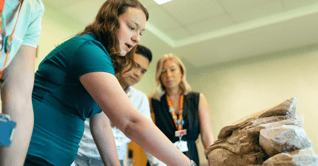Growing Quality Green Jobs
Driving Economic Advancement in the Green Economy
Get the report and executive summary sent to your inbox.
About the Report
Combating climate change and its ripple effects across society is an imperative of
our time. As extreme weather, resource shortages, and related challenges worsen, the
economy is shifting in response—but not quickly enough.
This moment presents a transformative opportunity, and we must seize it. New Jobs
for the Future (JFF) research shows how we can accelerate the transition to a green
economy—and do so in a way that prioritizes not only environmental sustainability
but also economic advancement for millions of people who have so far been left out
of the green transition.
Growing Quality Green Jobs: Driving Economic Advancement in the Green
Economy, developed in partnership with the Burning Glass Institute, with support
from the Ares Charitable Foundation, provides data-backed recommendations for
workforce developers, employers, and policymakers.
Key Takeaways
- A more expansive way of thinking about green jobs—analyzing the integration of green skills into occupations across the economy rather than focusing only on traditional green sectors—shows that green economic opportunity is more
prevalent than commonly thought. - All jobs can become greener through the integration of green knowledge and skills, and all green jobs have the potential to become quality green jobs through the integration of job-quality standards.
- Workforce developers, employers, and policymakers can use the principles of growing quality green jobs to expand economic advancement for people who are underrepresented in green sectors today.

A Focus on Green Skill Integration
Analyzing the growth of green skills shows how a traditional job can transform into a green job, or a job that is at least partly green. JFF and Burning Glass Institute analyzed nearly 200 million online job postings from 2018 to 2022 in the national Lightcast data set to identify these roles.
The report describes three levels of green skill integration, each more extensive than the previous one: additive, blended, and job-changing.
- Jobs at the additive level gain a small subset of new green skills within a broader set of responsibilities but maintain traditional overall roles and functions.
- Jobs at the blended level adopt broader sets of new green functions within existing roles and thus start to evolve.
- At the job-changing level, roles and functions are completely
changed due to their full integration of green skills.
The Green Transformation Cycle
Analyzing the continued growth of green jobs illuminates how the overall economy is becoming greener—and can become increasingly so. It also identifies occupations at risk of displacement because they are not green. Understanding the green transformation stage of a job enables workforce developers, industry leaders, and policymakers to make educated decisions about whether to invest in training for certain roles or make other interventions.
The report introduces the Green Transformation Cycle to illustrate four stages of green job
transformation: seed, scale, established, and at risk.
Our Opportunity
A truly just transition will not happen on its own.
Leaders and stakeholders representing workforce systems, education and training pathways, policymaking, community development, and more must prioritize economic activity that is interconnected with long-term environmental and social impacts. This will require removing the limitations around how we define and categorize green jobs and the transferable skills needed to build a climate-resilient future and workforce.
All jobs have the potential to become quality green jobs through the intentional integration of green skills, knowledge, and job-quality standards. Prioritizing job access and equity across communities will, in parallel, move us toward closing the racial and gender equity gaps that plague much of the current green movement. As our economy continues to respond to climate change, the Green Transformation Cycle framework can serve as a useful resource to prepare the U.S. workforce for a just transition to a strong, equitable, and accessible green economy for all.

Get the report and executive summary sent to your inbox.
Get your copy nowAbout Climate-Resilient Employees for a Sustainable Tomorrow (CREST)
CREST is a five-year, $25 million career preparation and reskilling initiative of the Ares Charitable Foundation (the “Ares Foundation”) that aims to help close the gap between the demand for a skilled workforce for green jobs and the number of people prepared for these opportunities. Working with our partners and local communities, the Ares Foundation can deepen our impact, harness new opportunities, and help create a green, resilient future that benefits generations to come.
Key Partners





